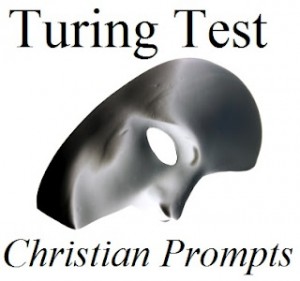This is the ninth entry in the Christian round of the 2012 Ideological Turing Test for Religion. In this round, the honest answers of Christians are mixed in with atheists’ best efforts to talk like Christians. It’s your job to see if you can spot the difference. The voting link appears at the end of the entry, and you can look at all entries in this round here.
When (if ever) have you deferred to your philosophical or theological system over your intuitions?
I’m a Catholic, and while I wouldn’t call Catholicism a “theological system,” I do think that if it doesn’t reshape at least some of your moral intuitions you’re probably not doing it right! Jesus came to challenge and to change us, after all. In my own life I’ve done this with a few questions, some more personal than others. In some cases I ultimately felt like I came to understand why the Catholic Church says what it does and agree. In other cases I gained some degree of greater understanding over time, mostly because I was able to see how the position fit into an overall vision of human nature, but I still didn’t feel like this was a position I understood from within or could defend well to others.
The harder question is why I trust the Church. It isn’t possible to parse a conversion completely, any more than you can parse a love affair, but it felt at the time like so many different kinds of evidence were all lining up, in totally unexpected ways. Catholicism provided theological grounding for previously-unsupported intuitions I had about the basic nature of the world; it provided the life of Jesus and the radical witness of the saints; it seemed to make people stranger, wilder, less enslaved by their wants and their culture. It was like a Magritte painting come to life: startling and kind of horrifying juxtapositions which rearranged everything I thought I was familiar with.
There are some issues I care about where I think the Church will change; I think it will move in a more pacifist direction, for example, away from a just-war framework. But I admit that it’s comforting to know that the Church won’t shift around on moral questions just because I do. I guess Catholicism seems sturdier than my own intuitions on most moral questions, and on the questions where I feel most sure of myself, so far there hasn’t been a totally irresolvable conflict.
Are there people whose opinions on morality you trust more than your own? How do you recognize them? How is trusting them different than trusting someone’s opinion on physics?
I’m not sure how many people’s moral beliefs I’d grant more authority than my own. I get that my own authority is shaky, but so is theirs! Even the saints often needed to be guided and corrected by the Church, although I’d definitely look to their lives when trying to figure out how to live out my beliefs.
I guess I turn to individual people more for the “how” than for the “what” of morality. There are definitely people I think have a much better grasp of how to live than I do. But some of those people also hold moral beliefs I find really wrong: My mother, for example, is an amazing and loving person, but the fact that she’s pro-choice doesn’t, honestly, undermine my own pro-life beliefs. I know I take her position more seriously because I admire her as a person, but that admiration doesn’t translate into adopting her moral positions when they conflict with my own—and I don’t think it should. I don’t think we should grant other individual, flawed humans the authority of God. I think there’s a difference in kind, not just degree, between the humility with which we should approach other people and the devotion with which we should approach God.
Can you name any works of art (interpreted pretty broadly: books, music, plays, poetry, mathematical proofs, etc) which really capture the way you see life/fill you with a sense of awe and wonder? You can give a short explanation or just list a few pieces.
Last night I watched a DVD of Mikhail Baryshnikov in performance. The classical ballet, especially as he practiced it, both fills me with awe and reflects a lot about how I see things. When he leaped it was sometimes as if he was offering himself directly to God, like St. Theresa in Bernini’s statue—and offering this total devotion made him more beautiful. Ballet, with its exaggerated movements and the elongated leg of pointe, also suggests to me a kind of dissatisfaction with ordinary existence, a desire to become extra-human. Ballet doesn’t reject the body or humanity but it does seem to yearn for something beyond the body as we now experience it. A truly great dancer’s work is like a postcard sent to that other world for which we were made.
Click here to judge this entry, and, once you’ve voted, feel free to speculate and trade theories in the comments or look at other entries in this round.
















